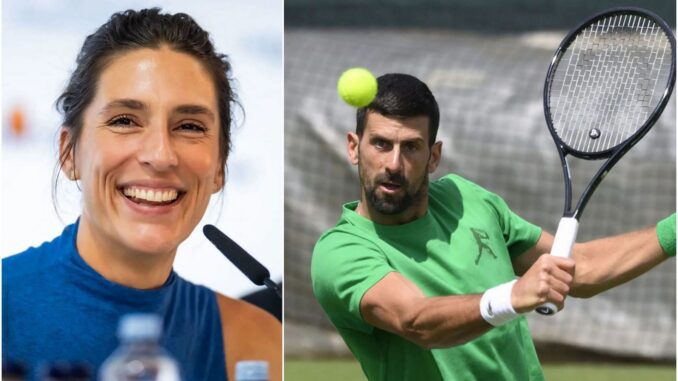
As the 2025 Wimbledon Championships loom, Novak Djokovic stands poised to cement his legacy as one of tennis’s greatest grass-court players, a surface where his game, by conventional wisdom, “shouldn’t work.” Yet, the 37-year-old Serbian, with 24 Grand Slam titles and a record 100 ATP trophies, continues to defy logic, blending adaptability and precision to dominate the All England Club’s hallowed lawns. Former German player Andrea Petkovic, a keen observer of the sport, recently dissected Djokovic’s extraordinary prowess on grass, marveling at how his unorthodox style and relentless movement make him a singular force. “That’s why Novak Djokovic is one of the best when it comes to lawn tennis,” Petkovic declared, highlighting his ability to glide on grass as effortlessly as he does on clay or hard courts.
Djokovic’s grass-court dominance, including seven Wimbledon titles, stems from a game that thrives on versatility rather than specialization. Unlike traditional grass-court players who rely on booming serves or net-rushing tactics, Djokovic treats the slick surface with the same methodical precision he applies elsewhere. Petkovic, speaking on a recent podcast, explained, “On first glance, his game shouldn’t work as well but he moves on grass like he does on any other surface and that gives him the advantage over players like me who either slip every time they try to sprint or break a hip every time they try to change directions.” His low, bent-knee stance allows him to navigate the unpredictable bounces of grass, turning defense into offense with uncanny ease. This was evident in his 2022 Wimbledon final against Nick Kyrgios, where he absorbed relentless serves to win in four sets, showcasing his ability to adapt under pressure.
The Serb’s recent form adds intrigue to his Wimbledon campaign. After a semi-final exit at the French Open to Jannik Sinner and a withdrawal from the 2025 Australian Open semi-finals due to a muscle tear, Djokovic silenced doubters by claiming his 100th ATP title at the Geneva Open in May, defeating Hubert Hurkacz. Petkovic, reflecting on his Australian Open run, praised his evolution: “He was still the same consistent percentage player who never misses but conscious of his age he hit the ball bigger and changed directions more frequently, yet still undetectable for the opposing side.” Against Carlos Alcaraz in Melbourne’s quarterfinals, Djokovic’s 4-6, 6-4, 6-3, 6-4 victory showcased this aggressive edge, outplaying the young Spaniard in a match Petkovic called a career highlight. “Novak still has it,” she asserted, predicting a 25th Grand Slam in 2025.
Djokovic’s grass-court success is also a testament to his mental fortitude. His ability to manage high-stakes moments, like saving match points against Roger Federer in the 2019 Wimbledon final, sets him apart. “Consciously breathing first,” Djokovic once explained, detailing his mental training to stay calm under pressure. This resilience, honed through years of facing Federer, Rafael Nadal, and Andy Murray, has made him the only man to hold all four majors simultaneously across three surfaces. Petkovic, a self-professed admirer, noted, “All those things that we thought were weird when we were 19, 20 years old, meditation, yoga, nutrition, it’s paying off now,” crediting his disciplined lifestyle for his longevity at 37.
As Wimbledon approaches, Djokovic faces a formidable field, with Sinner, Alcaraz, and Alexander Zverev all vying for the crown. Yet, his 100th grass-court win at Wimbledon 2021 and a 91% win rate at the Australian Open underscore his enduring dominance. Petkovic’s analysis highlights his technical precision: “It’s not been talked about enough how clean Novak’s groundstrokes are. That’s the reason why he never misses.” His partnership with coaches like Goran Ivanisevic, who refined his serve to 7,113 aces, and Andy Murray, whose influence bolstered his clay-court form, has kept him evolving. Despite health concerns, including a recent loss to Matteo Berrettini at the Qatar Open, Petkovic remains optimistic: “I’m not worried about Novak at all in terms of tennis, just worried about his health and if he’s healthy, he will be fine.”
Djokovic’s journey, from a war-torn Belgrade to tennis’s pinnacle, adds emotional weight to his quest. His polarizing persona, marked by moments like his 2023 Kosovo message at Roland Garros, has fueled debates, but Petkovic insists his numbers—24 majors, 40 Masters, 428 weeks at No. 1—settle the GOAT argument. As he eyes an eighth Wimbledon title, equaling Federer’s record, Djokovic’s grass-court wizardry remains a paradox: a game that shouldn’t work, yet works spectacularly, defying logic and captivating the tennis world.
Leave a Reply